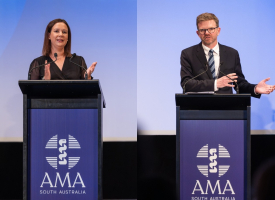Is private health dying?
The direction of Australia’s private health insurance system was explored at recent NatCon event.

The direction of Australia’s private health insurance system was explored at recent NatCon event.
An online panel discussion at the AMA’s recent National Conference (NatCon) addressed a myriad of issues facing Australia’s private health system in a forum titled: “Is private health dying? And could managed care finally kill it?”
AMA President Dr Khorshid argued that claims of private health’s demise were premature, however, it is in big trouble and outlined plans of how the AMA proposes to revive the ailing system.
He said private health insurance was in strife because for the past five years the proportion of Australians with health insurance had gone “down, down, down”, threatening the profitability and sustainability of the industry.
The private health industry is increasingly dominated by big for-profit players and policies with restrictions have increased. Funds claim that the problem for fund members was out-of-pocket costs.
Dr Khorshid said the data did not support this claim of private health insurers because 95 per cent of services were delivered at no gap or known gap.
“Young people have not been taking up products, leaving early or taking up highly-restricted products that do not deliver much in the way of value”, he said.
“It comes down to affordability with average wage growth being very low for young Australians under the age of 30. On the flip side we are seeing an increasing proportion of older Australians taking out private health insurance and, of course, they make claims that put health insurers at risk.”
Dr Khorshid said some of the insurers are moving towards managed care because private insurers paid about 70 per cent to hospitals and that is “where the big money is”.
He said if insurers get their way with US-style managed care, patients could expect to see reduced length of stay in hospital, reduced prosthesis choice, a reduction in choice of doctor, and increased costs.
“The losers will be patients and our health system. The United States has high-cost healthcare, despite providing low levels of access.”
“The AMA will not allow managed care to get a foothold in Australia. We will be in the trenches with others against managed care”, he said.
Dr Khorshid proposed “sensible reform and sensible regulation” to tackle issues facing private health and he drew a line in the sand on managed care.
There are some simple things that could be done in the short term, such as properly indexing Medicare to reduce gaps for patients and introducing health savings accounts allowing people to make a co-contribution to their health costs and pay their private health insurance.
Dr Khorshid also argued, “We need a ‘cop on the beat’ as a regulator of the private health system, not just insurance, but the whole health system, to create enough safe space for reform discussions to go ahead without the fear we have of the insurers”.
The AMA is modelling what an independent private health insurance regulator might look like with a focus on maintaining value for patients, clinical autonomy for doctors and having the capacity to drive reforms involving all players.
Dr Khorshid said, “A regulator might require transparency, it might limit what insurers are allowed to do in terms of managed care, it could limit vertical integration. It could improve prudential regulation so insurers are more viable. It can look at the prostheses list, private health premium increases, and a whole lot of other things done by government that are often political decisions.
“Australia’s public system is only viable when we have a big healthy private system to take the load off it and because of the size of the private system it only takes a small decrease to have a big impact on public hospital waiting lists.
“We acknowledge the issues facing private health, but I think we do have a way forward with sensible reform and sensible regulation and, hopefully, we can keep on having the best health system in the world”, he said.
The NatCon panel comprised Chair of the AMA Federal Council, Assoc Prof Julian Rait who chaired the panel, Dr Omar Khorshid, Dr Vijay Roach, Leanne Wells (speaking from the perspective of health consumers) and Peter Aroney (with an insurer’s point of view).



